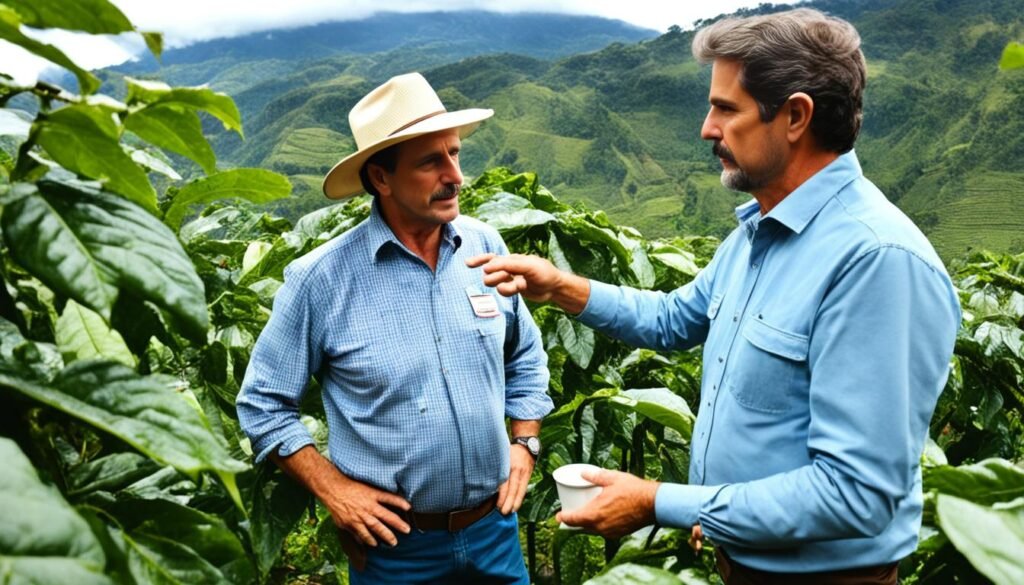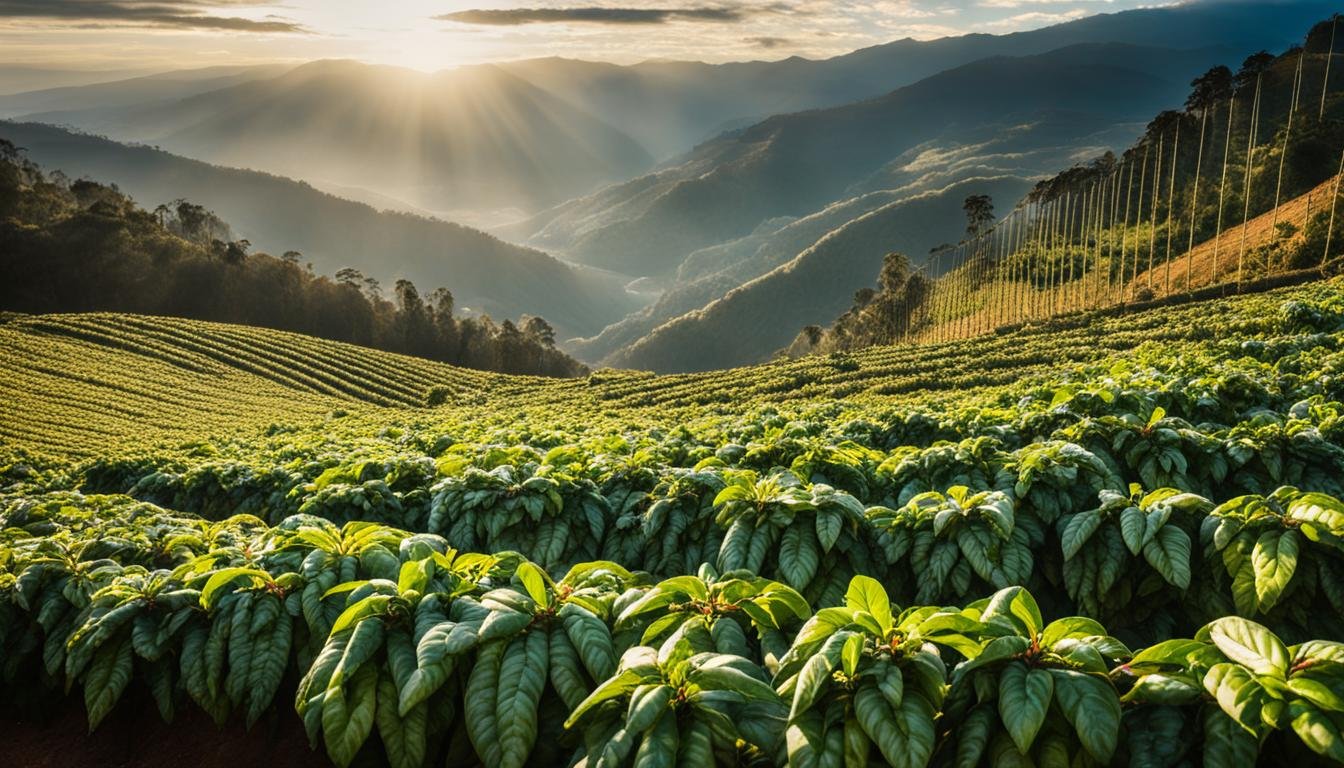Did you know that Colombia, home to the iconic Juan Valdez brand, produces over 13 million 60-kilogram bags of coffee annually, making it one of the world’s leading coffee exporters? This comprehensive guide delves into the intricate world of coffee production management in Bogotá, Colombia, exploring the sustainable practices, processing methods, and export logistics that contribute to the global recognition of Colombian coffee.
The Colombian coffee industry is a vital component of the country’s economy, renowned for its high-quality Arabica beans. From sustainable agriculture practices and specialty coffee varieties to precision agriculture tools and fair trade certifications, this guide offers a deep dive into the multifaceted aspects of coffee production management in Bogotá, Colombia.
Key Takeaways
- Colombia is a leading global coffee exporter, producing over 13 million 60-kilogram bags annually.
- The Colombian coffee industry is renowned for its high-quality Arabica beans and plays a crucial role in the country’s economy.
- This guide explores sustainable agriculture practices, specialty coffee varieties, and precision agriculture tools used in coffee production management in Bogotá, Colombia.
- The guide also delves into coffee processing methods, export logistics, and fair trade certifications that contribute to the global recognition of Colombian coffee.
- Readers will gain a comprehensive understanding of the multifaceted aspects of coffee production management in Bogotá, Colombia.
The Colombian Coffee Growers Federation (FNC)
The Colombian Coffee Growers Federation (FNC) is a non-profit organization that has played a pivotal role in the coffee industry of Colombia since its inception in 1927. As a democratic and representative organization, the FNC aims to ensure the well-being of coffee producers across the country.
History and Mission
Established in the early 20th century, the FNC’s mission is to serve as a coffee growers’ union, advocating for the interests and concerns of its members. Over the decades, the organization has evolved to become a key player in the Colombian coffee sector, driving initiatives to improve the lives of coffee farmers and maintain the country’s position as a leading global producer of high-quality coffee.
Organizational Structure and Governance
The FNC has a federated structure, with departmental and municipal committees operating throughout Colombia’s coffee-producing regions. This decentralized approach allows the organization to effectively represent the diverse needs and interests of coffee growers across the country. The FNC’s governance model is known for its transparency and commitment to creating value for its stakeholders, including coffee producers, exporters, and consumers alike.
Coffee Production in Colombia
Colombia is renowned for its exceptional coffee, which is grown in several key regions across the country. The central coffee region, the northern region, and the southern region are the primary hubs of coffee production in Colombia. This diverse landscape allows for the cultivation of a wide range of coffee varieties, each with its unique flavor profile and characteristics.
Variety Selection and Agronomic Practices
Colombian coffee is predominantly Arabica, with the majority of the crop planted with rust-resistant varieties. Producers in Colombia utilize modern agronomic practices to enhance productivity, such as the use of improved seeds and increased planting densities. By leveraging these techniques, they are able to maintain high-quality coffee beans throughout the year.
Coffee Production Calendar
The coffee production calendar in Colombia features two distinct harvest periods: the primary harvest from October to December and the secondary “mitaca” harvest from April to June. This bimodal pattern allows for a steady supply of coffee throughout the year, catering to the global demand for Colombia’s renowned coffee beans.

Research and Development
Colombia’s coffee industry is driven by a relentless commitment to innovation and technological advancement. At the heart of this effort is the National Coffee Research Center, known as Cenicafé, which has been instrumental in shaping the future of coffee production in the country.
Cenicafé, owned and operated by the Colombian Coffee Growers Federation (FNC), is the world’s largest coffee research center. Its mission is to develop cutting-edge technologies and deepen the scientific understanding of coffee to enhance the productivity, competitiveness, and sustainability of Colombia’s coffee sector. Through its dedicated team of researchers and state-of-the-art facilities, Cenicafé has been at the forefront of coffee technology development.
Advancing Coffee Cultivation
One of Cenicafé’s landmark achievements is the release of the high-yielding and disease-resistant Cenicafé 1 coffee variety. This variety, developed through rigorous research and experimentation, has been widely adopted by Colombian coffee growers, significantly boosting their yields and resilience to pests and diseases. Cenicafé’s research efforts extend beyond just varietal improvements, as the center also focuses on improving agronomic practices, post-harvest processing, and environmental sustainability.
Extension Services and Technology Transfer
The Colombian Coffee Growers Federation (FNC) plays a crucial role in supporting the country’s coffee producers through its extensive extension services. The FNC’s Extension Service is dedicated to transferring the latest technology and best practices to coffee growers across Colombia. This endeavor aims to enhance the profitability of coffee farming and improve the well-being of producers, their families, and local communities.
Through educational processes and field demonstrations, the Extension Service equips coffee growers with the knowledge and tools to boost their productivity and adopt sustainable farming methods. The goal is to promote active participation in technical, economic, environmental, and social programs that can elevate the overall sustainability of the coffee sector in Colombia.

By bridging the gap between research and on-the-ground implementation, the Extension Service plays a vital role in the coffee industry’s continuous evolution. The transfer of cutting-edge technologies and agronomic practices empowers coffee growers to make informed decisions, optimize their operations, and respond to the dynamic challenges facing the industry, such as climate change and evolving market demands.
The FNC’s commitment to technology transfer and extension services has been instrumental in strengthening the resilience and competitiveness of the Colombian coffee sector, ensuring its long-term sustainability and prosperity.
Colombia: Coffee production management Bogotá Colombia
The Colombian Coffee Growers Federation (FNC) plays a pivotal role in managing coffee production in the country. One of the FNC’s key initiatives is the coffee purchase guarantee program, which ensures that coffee growers can sell their harvests at a transparent base market price, paid in cash at locations close to their farms. This program, executed through a network of coffee cooperatives, is a vital component of the FNC’s efforts to support the economic and social development of coffee producers.
Coffee Purchase Guarantee Program
The FNC’s coffee purchase guarantee program provides stability and security for coffee growers in Colombia. By offering a guaranteed market price for their harvests, the program helps to protect farmers from market fluctuations and ensures they receive a fair return on their labor. This program is a vital safety net for the country’s coffee industry, contributing to the overall sustainability and prosperity of the sector.
Quality Control and Certification
In addition to the purchase guarantee program, the FNC is responsible for managing the National Register of Coffee Exporters and establishing the requirements for the registration of roasters, millers, and soluble coffee factories in Colombia. This process ensures rigorous quality control and certification standards are maintained throughout the coffee supply chain. By upholding these standards, the FNC helps to maintain the reputation of Colombian coffee as a high-quality, traceable, and sustainable product.
Marketing and Promotion
The Colombian Coffee Growers Federation (FNC) has developed the iconic Juan Valdez® brand to promote and market Colombian coffee globally. The Juan Valdez character represents the values and traditions of Colombian coffee culture, serving as an ambassador for the country’s premium coffee. The FNC also manages the “Café de Colombia” brand, which guarantees that the coffee product is 100% of Colombian origin and produced to the highest local standards.
Juan Valdez® Brand
These marketing and promotion efforts have been instrumental in positioning Colombian coffee, such as the Juan Valdez brand, as a sought-after specialty product worldwide. The Juan Valdez character, with his traditional attire and mule, has become a symbol of the rich coffee heritage and the hard work of the Colombian coffee growers. The FNC has effectively leveraged the Juan Valdez® brand to raise awareness and build a strong emotional connection with coffee consumers globally.
In addition, the “Café de Colombia” brand has played a crucial role in highlighting the quality and origin of Colombian coffee. This brand assurance ensures that consumers can trust the authenticity and high standards of the coffee they purchase, further strengthening the reputation of Colombian coffee in the international market.

Sustainability and Social Responsibility
The Colombian coffee industry, led by the esteemed Colombian Coffee Growers Federation (FNC), is steadfastly committed to sustainable and environmentally-friendly practices across the supply chain. Through a range of innovative initiatives, the sector is working to minimize its environmental impact and promote social responsibility within coffee communities.
Environmental Initiatives
One of the key priorities for the FNC is the promotion of sustainable coffee production methods. This includes encouraging the cultivation of shade-grown coffee, which helps to preserve biodiversity and natural ecosystems. Additionally, the industry is focused on water conservation and efficient waste management, ensuring a reduced carbon footprint and more sustainable use of natural resources.
Fair Trade and Certifications
Alongside its environmental efforts, the Colombian coffee sector strongly supports fair trade and other certification programs that prioritize social responsibility. These initiatives help to guarantee equitable economic opportunities for coffee growers and their communities, ensuring that the benefits of the industry are shared fairly. The FNC’s commitment to these certifications demonstrates its dedication to social sustainability and the wellbeing of coffee producers.
Coffee Processing and Exports
Colombia’s coffee industry has developed sophisticated processing capabilities, including the production of freeze-dried coffee. Buencafé Liofilizado de Colombia, one of the world’s largest and most advanced freeze-dried coffee processors, plays a crucial role in this sector. The country’s coffee exports are managed through a well-established logistics network, with Almacafé serving as a key logistics operator and general coffee warehouse.
Processing Methods
The Colombian coffee industry has mastered various processing methods to ensure the high quality and consistency of its exports. From traditional wet processing to advanced freeze-drying techniques, the industry continuously innovates to meet the evolving demands of global coffee markets. These processing methods help maintain the distinctive flavor profiles and characteristics that make Colombian coffee so sought after worldwide.
Export Logistics and Markets
Colombia’s coffee exports are facilitated by a robust logistics network, enabling the efficient transportation and distribution of the country’s premium coffee beans to key international markets. The United States remains a crucial export destination for Colombian coffee, complemented by other major markets such as the European Union and Asia. This strategic export focus allows Colombian producers to reach a diverse global consumer base, showcasing the exceptional quality and unique attributes of their coffee products.

Challenges and Opportunities
The Colombian coffee industry faces significant challenges posed by climate change. Increased incidence of pests like the coffee borer and adverse weather patterns have impacted crop yields and quality. To address these climate change impacts on coffee, the industry is exploring the adoption of precision agriculture techniques and digital technologies.
Precision Agriculture and Digital Technologies
Precision agriculture and innovative digital solutions hold great promise for enhancing productivity, resilience, and sustainability in Colombia’s coffee production. By leveraging precision agriculture, growers can optimize inputs, monitor crop health, and respond to environmental stressors more effectively. Similarly, the integration of digital technologies, such as remote sensing, data analytics, and smart farming systems, can provide valuable insights to guide decision-making and improve overall coffee production management.
These advancements, combined with the ongoing research and development efforts of Cenicafé, Colombia’s national coffee research center, aim to ensure the long-term viability and competitiveness of the country’s coffee industry in the face of climate change challenges.
Domestic Coffee Consumption
While Colombia is a major coffee-producing nation, domestic coffee consumption within the country remains relatively low compared to other coffee-producing regions. The Colombian Coffee Growers Federation (FNC) is actively working to promote increased domestic coffee consumption in Colombia through its “Café de Colombia” branding and marketing campaigns.
These initiatives aim to educate and encourage Colombian consumers to appreciate the unique qualities and heritage of their national coffee. The “Look for the Colombian Coffee Quality Triangle” program, for instance, helps consumers identify and appreciate the distinctive characteristics of Café de Colombia brand coffee.
By highlighting the exceptional flavor profiles, sustainability practices, and cultural significance of Colombian coffee, the FNC hopes to foster a greater appreciation for the country’s coffee among domestic consumers. This, in turn, could lead to a rise in domestic coffee consumption in Colombia, benefiting both the local coffee industry and the overall economy.
Conclusion
Colombia’s vibrant coffee industry, meticulously managed by the Colombian Coffee Growers Federation (FNC), stands as a shining example of the country’s commitment to quality, sustainability, and social responsibility. From the cutting-edge research and development initiatives at the National Coffee Research Center (Cenicafé) to the extensive network of extension services and technology transfer, the FNC’s comprehensive approach has solidified Colombia’s position as a global leader in specialty coffee production.
As the industry faces the challenges posed by climate change, the FNC continues to embrace innovative solutions and digital technologies to ensure the long-term prosperity of Colombian coffee growers. Through programs like the Coffee Purchase Guarantee and rigorous quality control measures, the FNC has not only protected the livelihoods of its producers but also elevated the reputation of Colombian coffee on the global stage.
The success of the Juan Valdez® brand and the FNC’s dedication to sustainable practices and fair trade certifications further demonstrate the industry’s unwavering focus on producing high-quality, ethically-sourced coffee. With strong export logistics and a diversified global market presence, the Colombian coffee industry remains poised for continued growth and leadership in the international specialty coffee arena.
Source Links
- About us – Federación Nacional de Cafeteros – https://federaciondecafeteros.org/wp/federation/about-us/?lang=en
- Federation – Federación Nacional de Cafeteros – https://federaciondecafeteros.org/wp/federation/?lang=en
- PDF – https://apps.fas.usda.gov/newgainapi/api/Report/DownloadReportByFileName?fileName=Coffee Annual_Bogota_Colombia_CO2024-0007.pdf


